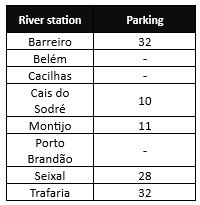Intervention axis #1: Infrastructure and Intermodality
In the last decades, the use of private cars has been given excessive primacy, particularly within localities. The consequence was to negatively affect the quality of public space and its potential for enjoyment by everyone and limiting the enjoyment of active modes.
In order to reverse the trend, adapting the physical context to the specific needs of users is the priority.
A guide with national standards for physical interventions
The development of a normative document, adapting international good practices to the national reality, «will make the implementation of appropriate and attractive solutions for cyclists and compatible with different uses common and accessible».
Normative Document for Municipal Road Networks in Urban Environment:
- Volume I – Fundamentals of users and the road network
- Volume II – Geometric features for highways for motor traffic
- Volume III – Geometric characteristics for non-motorized traffic roads
- Volume IV – Calming measures and other traffic devices
Installation of bicycle parking lots
Bicycle parking must be present in all destinations that generate or attract trips, using standardized technical solutions, guaranteeing safety conditions and aiming at the comfort of bicycle users, with a practical and accessible location and in adequate quantity to demand.
In this context, financial support has been made available for the installation of parking lots:
- Notice No. 5/2023 – Support for the promotion of public transport and training of transport authorities
- Notice No. 3/2023 – Support for the development of strategies to improve school mobility
- Notice No. 5/2021 – Support for the promotion of complementary modes of transport
- Notice No. 3/2021 – Support for the acquisition and installation of equipment for bicycle parking
Intermunicipal cycling networks
The creation of strategic intermunicipal axes with direct and interconnected links, enhancing existing or planned networks, is part of the Portugal Cyclable 2030 iniciative.
Promoting cycling routes for sports and leisure
In addition to promoting daily bicycle use, it’s essential to consider its role in leisure and sports. Here are some products and projects that encourage national and international cycling and offer cycling routes:
- National Ecopistas Network: these autonomous communication routes are reserved for non-motorized travel. They allow for tourist, sports, educational and environmental awareness routes. Suitable for walking, cycling, wheelchairs use, rollerblading and other forms of gentle mobility. Many of these routes repurpose and revitalize disused paths, canals and railways.
- Cycling Portugal Centers and Routes: divided into four categories – BTT XC, Road, Gravel and Enduro – result of collaborative efforts by promoting entities and the Portuguese Cycling Federation. Aims to position Portugal as an excellent destination for leisure and tourism cycling.
- Euro Velo Network: currently includes 17 long-distance cycling routes crossing Europe. In Portugal, the existing route is the Atlantic Coast Route.
- Portuguese Trails: showcase national cycling and walking offering in regions such as Porto and the North, Central Portugal, Lisbon, Alentejo, Algarve and the Azores and Madeira archipelagos.
Intervene with public transport operators
Full accessibility to public transport for people with disabilities or reduced mobility, including infrastructure, rolling stock and information systems is one of the guarantees that the Strategy wants to achieve. The transport of bicycles and wheelchairs (manual or electric) must be practical and accessible, by rail, river and road, for interurban and urban travel.
Currently, in practice:
Promote the implementation of public bicycle-sharing systems
Providing bicycles as a transport service has enormous potential and the Strategy aims to generalize its use, particularly when systems include electrically assisted vehicles.
In 2021, the Public Transport Service Fund supported the acquisition and installation of equipment for bicycle parking.




